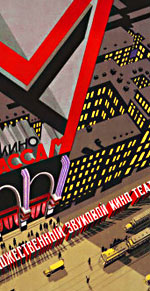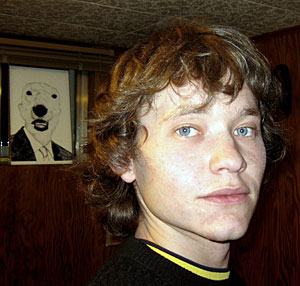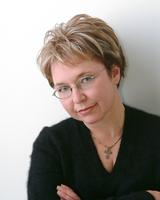
| Jacket 36 — Late 2008 | Jacket 36 Contents page | Jacket Homepage | Search Jacket |
This piece is about 5 printed pages long. It is copyright © Peter Golub and Jacket magazine 2008. See our [»»] Copyright notice. The Internet address of this page is http://jacketmagazine.com/36/rus-00-intro.shtml

Back to the Russian poetry Contents list
1
The faults of the anthology before you are clear: 1) it is an anthology, 2) it is an anthology of translations. These faults are so basic that I will not articulate them merely to present the usual counter arguments. If you have made it this far — if you are curious enough about this work — then you do not need me to explain why Robert Frost was wrong when he said that poetry is lost in translation, or how anthologies can be useful, even if they are never consummate.
Paragraph 2
It should be clear to the reader that translations are always imperfect, but I would add that so is the process of reading. To look at a page or screen covered with black marks, and to reconstruct those marks inside the brain in order to create poetry is essentially the process of translation. This process of reading, like translation, is subject to mutation — there is a necessary degree of misunderstanding between the author and the reader. These mutations can reveal new possibilities never imagined by the author, and if the reader/translator is doing a good job, the poem is improved by these mutations. That is, the poem evolves.
3
With that said, let me briefly introduce this anthology, which attempts to represent the young Russians who are challenging and changing the field of contemporary Russian poetry. Nearly all the poets in this anthology are in their 20s or 30s, and many have never been translated before.
4
These poets are both the catalysts and the products of a paradigm shift in Russian letters. They came of age when the traditional institutions of the Soviet Union no longer existed or when these institutions were undergoing heavy revision during perestroika.
5
These poets have an inclusive approach to poetry, and this has often made their older colleagues suspicious of whether the writing counts as poetry at all. Hence, many of these authors are polemicists, whose main goal is to broaden the possibilities of poetry — to expand the definition of poetry. Today, there is a tumultuous atmosphere in Russian poetry, and if you are like me, then this is a good thing.
6
In 1924, the Russian avant-garde critic, Yuri Tynyanov, wrote: “There is less and less poetry, but instead more and more poets.” [Note 1] Some contemporary critics have used this quote as the beginning of an attack on the new Russian poetry, because in their eyes the new poets are indistinguishable from one another.
7
Tynyanov’s complaint turned out to be unwarranted — the 1920s were some of the most vibrant years in Russian poetry. However, the concern of the critics is that the pendulum has swung too far the other way; the new poetry all sounds the same — there are no individual voices, just a bunch of chatter. Of course, by reading this anthology one quickly understands how different these poets are, that a poet like Marianna Geide is quite different from say Anastasia Denisova.
8
However, the basic accusation leveled against new Russian poetry is essentially true. That is, this new wave of poets thinks and writes in what one might call the same “spirit.” In their own ways, all of these poets are dealing with a common set of issues. These issues can be broken up into two categories: 1) the kind of issues faced by all young poets; 2) the kind of issues facing specifically young Russian poets.
9
For instance, consider the problem of sincere speech. In a sense, this problem has been haunting poetry since WWII and Theodore Adorno’s famous pronouncement about the impossibility of writing poetry. On the other hand, this is a problem specific to new Russian poets, who are still trying to climb their way out of Soviet speech, and the conservative poetic tradition that prevailed in Russia for the majority of the 20th century.
10
The first step in this process was taken by poets like Dmitry Prigov, Lev Rubenstein, and Andrei Monastirsky, who founded Russian literary Conceptualism in the 1970s to expose the absurdity of speech. But for the most part this poetry relied on the speech of the Soviet Union, and by the 21st century Conceptualism was anachronistic.
11
After the death of Conceptualism, the question remained: How does one say something sincere after Conceptualism demonstrated that any utterance is essentially cliché? This question is important for many young poets who write a kind of primitive sentimental lyric, which attempts to construct poetry from the very building blocks of meaning.
12
Here we see obvious parallels with Objectivism and other Modernist European poetry, but these poets are a unique case, because they are readdressing the possibility of sincere/true language in the context of 21st century Post-Soviet Russian culture. Of course, the problem of sincere speech is not limited to a particular time or movement, but results from the fact that poetry is made of language, a multifarious and multipurpose thing.
pp.
These issues are important to all human beings, and by watching the young Russians play with language, by watching them attempt to say something sincere, true, and beautiful, I feel that poetry is still meaningful, that it can still inform us about the nature of the human condition.
13
The main element that makes contemporary Russian poetry distinct is of course the Soviet Union and its fall, which caused an enormous paradigm shift in Russian literature. It is important to understand that these young poets did not come of age in the stagnant cultural milieu of the Soviet Union; they were not raised on clandestine copies of Lolita, let alone Doctor Zhivago. This new generation is the product of the explosive and diverse time of perestroika and the 1990s.
14
The world in general, and culture in particular, seemed to these young authors unstable, continually changing, each new publication demanding a reappraisal of set ideas. Therefore, it cannot be said of the majority of significant writers who entered literature from the late 80s and early 90s that they inherited any particular tradition, based on earlier Russian poetry. From the very onset of their literary careers, they found themselves at an intersection of many paths, with the option of freely combining different ones, of combining incompatibles. [Note 2]
15
The Soviet literary world had unique organizing principles, which became less relevant after the fall. The shift from clandestine literature to free and open literature deemphasized the organizing principle of the circle, which had made it easy to tell if an author was “in” or “out.” By the 1990s the easy dichotomies were defunct, leaving the literary field without its poles, without its distinct pluses and minuses. However, the dominant group of poets that came to replace the official Soviet establishment is still a product of the Soviet era, and many of their ideas about poetry are not so different from the official Soviet poets, i.e. they operate with the same map.
16
Many young authors who emerged after the fall do not have the navigational tools left over from Soviet literature, and see themselves as distinct from their predecessors. The historical paradigm shift that occurred during perestroika created something different, and it is clear that a new generation of authors has emerged to represent the Post-Soviet era.
17
Also, unlike Russian prose — which has recently experienced a pulp fiction boom — Russian poetry is unprofitable. In the American sphere, this problem is in part answered by the system of creative writing programs. If a young American fancies herself a poet she can get an MFA, publish in a wide variety of literary journals, get a teaching position in a liberal arts school, etc. But this is a relatively new phenomenon — many of these programs are only a few decades old — and there are few analogues in Russia.
18
Pierre Bourdieu writes that poetry belongs to the field of restricted cultural production, and that it
19
“lives in the hectic rhythm of aesthetic revolutions, which divide the continuum of ages into extremely brief literary generations... creating opposition within the field of restricted production, between the consecrated avant-garde, the established figures, and the newcomers.” [Note 3]
20
The new poets in this anthology are clearly in the latter category.
21
These literary generations are not biological, but constructed by young writers in order to separate themselves from the dominant groups in the field. And, of course, it is clear that just because many young poets declare themselves members of the new generation does not mean that others do not choose to align themselves with the traditional camp.
22
However, I selected the great majority of the poets in this anthology because they belong to the category of newcomers who are not disposed to enter the cycle of simple reproduction, i.e. to recognize the old hallowed literature and do likewise. Many of these poets bring with them dispositions that clash with prevailing norms and expectations.
23
It is harder for the new generation to etch out new territory, because unlike the previous generation — which denounced official Soviet literature in order to create more space — this new generation cannot simply resist the dominant field, because the dominant field no longer consists of official Soviet literature, but of legitimate literary figures like Osip Mandelshtam, Gennady Aigi, and Joseph Brodsky, and living writers like Kolya Baitov, Evgeny Rein, and Elena Schwartz.
24
The new generation cannot merely push the old generation from the center, but must create something new. Their task is to add new space to the existing field, to carefully balance respect for the older authors and also to challenge the establishment with a call for new literature. This means playing by the rules of the field, and facing competition from its established figures, while trying to be catalysts of change.
25
Late 20th century Russian poetry is a tortuous thing, way beyond the scope of this introduction, but some knowledge of the generation preceding the new poets is valuable. This is why I’ve decided to begin the anthology with poems by Dmitry Prigov and a few other older authors. These authors are meant to function as a backdrop for the young authors.
26
The aim of this anthology is to show the English reader what is new in contemporary Russian poetry. My hope is that all readers of poetry can read this anthology, and find at least a few of these poets to their liking. If this project is successful, it will raise awareness and appreciation for the new poetry efflorescing in contemporary Russia.
[1] Стихов становится
все меньше и
меньше, и, в
сущности,
сейчас есть
налицо
не
стихи, а
поэты. Yury Tynyanov. “Promeshutok,”
Poetica. Istoriya literaturii. Kino. Nauka, 1977 p.168
[2] Dmitry Kuzmin. An Anthology of Contemporary Russian Women Poets. Ed. By Valentina Polukhina and Daniel Weissbort. Iowa University Press, 2005 p.209.
[3] Pierre Bourdieu. “The Field of Cultural Production, Or: The Economic World Reversed.” tr. Richard Nice. Poetics 12, 1983 p.333.
Absinthe: New European Poetry issue 9: Danila Davydov “The Poet Isn’t Needed” “The Tender Way of Things” “The Crow and the Dead Commissar” “It’s not Interesting” (2008)
Asheville Poetry Review: Viktor Ivaniv “Chimera” (2007)
Caketrain issue 2: Julia Idlis “You Love a Certain Person” (2007)
Cimarron Review issue 14: Anastasia Afanaseiva “Candy God” (2007)
Circumference issue 6: Polina Barskova “Hampshire Archive. Personalia” (2008)
Rhino issue 7: Natalya Kluchreva “Laying in the Field” (2008)
St. Peterburg Review issues 1 and 2: Viktor Ivaniv “House from Beneath the Table” (2007); Marianna Geide “The Marriage of St. Catherine of Alexandria; Anastasia Afanaseiva “Oranges light up in the sky”(2008)
Taiga issue 1: Viktor Ivaniv “Sun Funeral” (2008)
Ugly Duckling Presse : Dmitry Golynko “As It Turned Out” is the title poem of a book published in 2008; and Alexander Skidan’s “Red Shifting” is the title poem of an Ugly Duckling book published in 2007.
Words Without Borders July issue: Tatyana Moseeva “Susan Sarandon” “Well Hell Then What” (2007).
Zoland issue 2: Elena Fanailova “I want to live like a snail, wrapped in gauze”; Alexandra Petrova “The silence of the tree is singing” (2008)
Zone For None January issue: Danila Davidov “A Short Epistle For Ulrike Meinhof”; Julia Idlis “And there were no living, nor dead” (2007)
This project was a huge collaborative effort, besides the co-editor Tatyana Golub, the authors, and the translators, I would like to thank: Dmitry Kuzmin, Donald Revell, Claudia Keelan, Andrew Haley, Morgan Duda, and Jesse Longman.

Peter Golub
Peter Golub is a Moscow born poet and translator. He has published translations of Russian poetry in various journals. In 2007 a bilingual edition of his poems, My Imagined Funeral, was published in Russia. To learn more go to his blog.

Tatyana Golub
Tatyana Golub is a Russian born translator. She lives in Salt Lake City and lectures at the University of Utah. Her contribution to this anthology was imperative — without her help many of these translations would certainly be poorer.